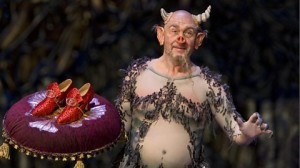
Maxim Mikhailov as The Devil in the Royal Opera House production of Cherevichki, 2009.
In Tchaikovsky’s opera Cherevichki (The Tsarina’s Slippers), the hero is sent on an impossible mission by his beloved: bring me the Tsarina’s slippers. With the aid of the Devil, who has gotten caught after a number of mishaps, Vakula is whisked off to St. Petersburg, succeeds in his mission and brings in the slippers in triumph to Oxana who tells him, of course, that she wants him, not the slippers.
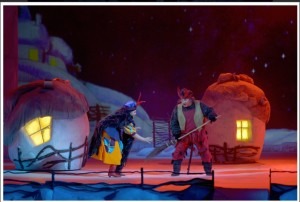
Vasily Gorshkov as the Devil in Rimsky-Korsakov’s Christmas Eve, Mariinsky Theatre, 2008
Rimsky-Korsakov took up the same story in his opera Christmas Eve, but with much more dramatic music.
Rimsky-Korsakov: Christmas Eve Suite: III. Witches’ sabbath and ride on the Devil’s back (Royal Scottish National Orchestra; Neeme Järvi, cond.)
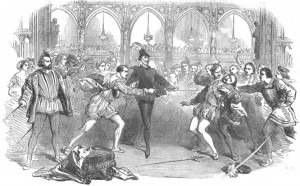
Faust duels with Count Hugo as Mephisto looks on in an 1852 production at the Royal Italian Opera in London.
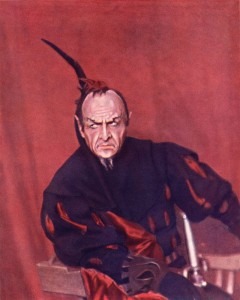
Feodor Chaliapin as Méphistophélès, 1915, by Sergey Prokudin-Gorsky
A better known version is Gounod’s grand opera Faust of 1859. In this scene, Méphistophélès is just singing and playing the guitar. It may be a serenade, but it’s suitably scary.
Gounod: Faust: Act IV: Cavatina: Vous qui faites l’endormie (Méphistophélès) (Nicolai Ghiaurov, Méphistophélès; Paris National Opera Orchestra ;
Georges Prêtre, cond.)
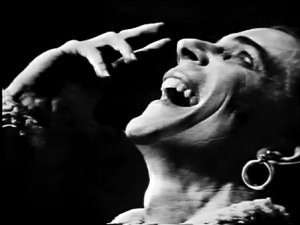
Norman Treigle
Boito: Mefistofele: Prologue: Ave, Signor (Mefistofele) (Norman Treigle, Mefisofele; London Symphony Orchestra; Julius Rudel, cond.)
In the 20th century, Russian composer Alfred Schnittke took the original story from 1587 as the basis for his 1995 Historia von D. Johann Fausten, the most famous scene of which is the tango as sung by the Devil on the death of Faust in the third act. We can hear it in the Faust Cantata that preceded the opera – there is no recording of the opera.
Schnittke: Faust Cantata: VII. Es geschah (It came to pass) (Mikael Bellini, countertenor, Mephistophiles; Malmo Symphony Chorus; Malmö Symphony Orchestra ; James DePreist, cond.)
Next: The Devils Did It – II


